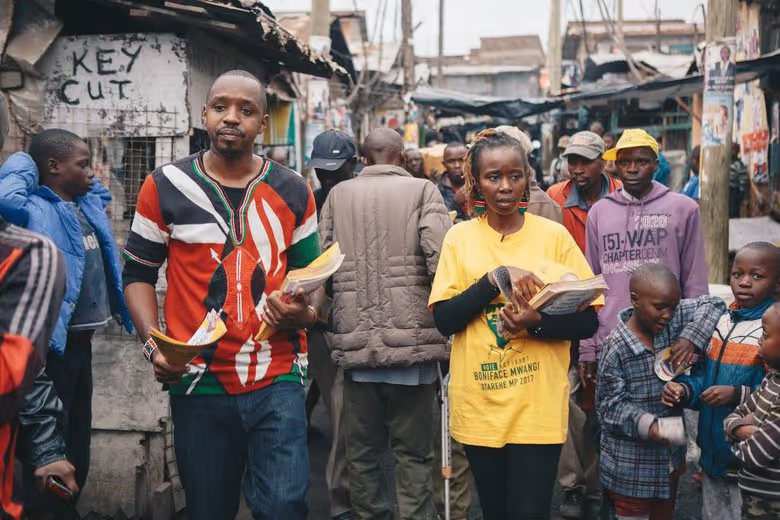Discussion Guide
Grades 6-8
Grades 9-10
Grades 11-12
Softie Discussion Guide Discussion Questions: After Viewing 'Softie'
Discussion Questions: After Viewing 'Softie'

Starting The Conversation
Immediately after the film, you may want to give people a few quiet moments to reflect on what they have seen or pose a general question (examples below) and give people some time to jot down or think about their answers before opening the discussion:
- If you were going to tell a friend about this film, what would you say?
- Describe a moment or scene in the film that you found particularly striking or moving. What was it about that scene that was especially compelling for you?
- If you could ask anyone in the film a single question, whom would you ask and what would you want to know more about?
- Did anything in the film surprise you?
What aspects of the film (landscape, language, feelings, family dynamics, etc.) were relatable? If so, what felt familiar? If not, what felt new and unfamiliar?
PROMPT ONE: Colonial pasts and tribalism
- In what ways do legacies of violence and colonization by a foreign power have lasting impacts on people living in colonized territories? (Take, for example, the history of tribal categorization introduced by the British to Kenyan people.)
- What are some examples from the film that highlight the lasting impact of colonialism on the way people view themselves and others?
- How are colonial pasts rooted in white supremacist ideas?
- In what ways did colonialism and tribalism promote unity and/or division in Kenya?
- In regards to tribalism, what questions does this film raise about how people come to identify with one another and seek feelings of belonging?
- In what ways does feeling a sense of belonging sometimes require exclusion of others?
- In that sense, can tribal or ethnic ties to belonging be divisive? Does it have to be?
- How are peoples’ personal identities impacted by the political context and conditions of their lives? In what ways are these personal and political identities shaped by histories that are not commonly taught?
- How does historical political trauma become internalized by individuals? What are some examples of the film that show the lasting impacts of oppression on individual and community identities?
- How have histories of colonization, political oppression, and whiteness impacted the lives of Black and Indigenous people?
- Can you recognize any of these impacts on people, or groups, in your communities today?
- Why might we not be taught about these histories in schools? In what ways is education connected to the legacy of colonization and political oppression?
PROMPT TWO: Community Resistance and Community-led mobilization and Grassroots Organizing
- What makes someone a strong community leader or activist?
- Based on what you learned in the film, what are some supports that community leaders need to engage in resistance to unjust policies and practice?
- As we see in Softie activism can happen in many different ways. What are some forms of being active in political movements that you recognized in this film for the first time?
- Who determines what counts as activism?
- How do you believe activism gets measured and different strands of activism are valued as more worthy than others?
- Has this film offered you new ways to think about being an activist that inspire you to frame personal community work differently?
- What are some ways you can engage in activism in your own community?
- What responsibility does an individual have to make society better?
- In what ways can a single individual inspire change?
- In what ways can a single individual not work for change alone?
- What is the role of solidarity and people-power in movements for political change?
- How is economic oppression part of a larger project of political disenfranchisement? What systems and structures work to keep people with power and wealth in positions of power and keep those without the same resources disenfranchised?
- To what extent is collective action necessary to push back against injustice?
- What is a just and equal society? Does it exist and/or can it be achieved?
PROMPT THREE: Personal and political
- In what ways is the personal always political? What examples from the film highlight this? Do you have any examples from your own life that are relatable?
- In what ways is the political always personal? What examples from the film highlight this? Do you have any examples from your own life that are relatable?
- Is it a politician’s responsibility to promote equality and to ensure everyone has the same rights?
- Is it their responsibility to ensure a fair and just community/country?
- What is the role of people and communities in holding those with power (ex. politicians) accountable?
- How can people learn to talk about injustices, push against injustices and remain civil?
- Should individuals stand up for what’s right when it puts them and those around them at risk?
- What do the conditions of risk and threat suggest about systems and structures of power? Why, for example, are activists and political leaders who are fighting for justice and equality put at heightened risk or threat? Who, and what, is threatening them?
- What are the people in positions of power afraid of? Why?
- Softieis very much on the front lines at the forefront of change, but how does his wife Njera propel the movement from behind the scenes?
- Is making change worth risking it all?
- Are all the decisions we make political?

